AfDB approves $500 million loan for Nigeria’s economic and energy reforms
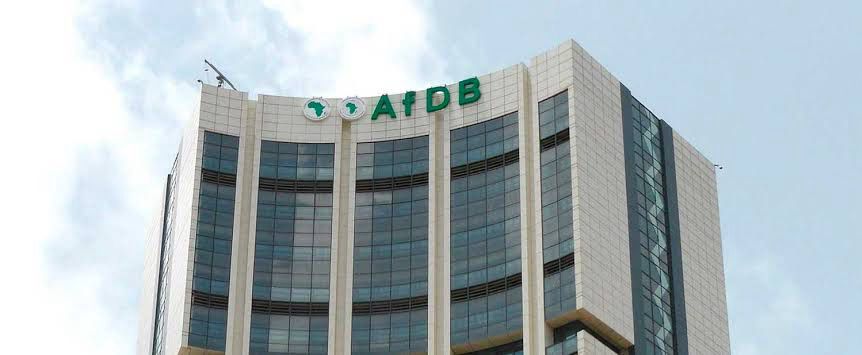
By: ThinkBusiness Africa The African Development Bank Group (AfDB) has committed $500 million to the Nigerian government, approving a crucial loan to finance the second phase of the Economic Governance and Energy Transition Support Programme. AfDB said in a statement on Wednesday. According to AfDB the policy-based operation is designed to cover the fiscal years 2024 and 2025 and will build upon the achievements of the programme’s initial phase. The overarching goal of the second phase is to stimulate inclusive growth in Nigeria, by fast-tracking structural reforms within the energy sector and supporting progressive fiscal policy adjustments aimed at boosting non-oil revenues to expand the nation’s fiscal space. “The second phase of the programme aims to stimulate inclusive growth by accelerating structural reforms in the energy sector, while supporting progressive reforms of fiscal policy to boost non-oil revenues and expand fiscal space. The new phase will consolidate and build on the achievements of the first phase,” said Abdul Kamara, AfDB Group Director General in Nigeria. Phase I, which was also a $500 million loan approved by the AfDB in August 2024, was the inaugural part of this two-year programmatic series covering the fiscal years 2024 and 2025. One of the key fiscal reforms supported by the initial phase 1 funding is for the approval of a national tax amnesty scheme, to encourage high-net-worth individuals and informal businesses to join the tax net,and increase non-oil revenues. On the energy side, ‘Metering Policy’ was a key action supported by the first phase; to close the massive metering gap in the Nigerian power sector. The newly approved funding reinforces the African Development Bank Group’s significant financial engagement in Nigeria. As of 31 October 2025, the AfDB’s active portfolio in Nigeria comprised 52 projects with a total commitment of $5.1 billion. Private businesses are also expected to gain significantly through an improved investment climate and new opportunities, particularly within the energy sector at the state level. The reforms are aimed at creating an environment more conducive to public-private partnerships PPPs.
National Stakeholders Rally to Boost Nigeria’s Water and Climate Resilience

By: ThinkBusiness Africa In a significant move to tackle Nigeria’s intertwined challenges of water scarcity, food security, and climate vulnerability, a broad coalition of national stakeholders officially launched the Lokoja Dialogues platform on Wednesday. The independent, non-profit initiative is dedicated to strengthening Nigeria’s resilience by applying the comprehensive Water, Energy, Food, and Ecosystems (WEFE) nexus approach to community-level challenges. Convened by Mrs. Polly Alakija, the platform’s launch introduced a unique engagement model designed to bridge the gap between community realities, technical expertise, national policy planning, and investment opportunities. Mrs. Alakija noted that despite the country’s abundant water resources, equitable access and effective management remain elusive. “Nigeria’s water crisis is not about availability, it is about access. And certainly, we can say that our broken water cycles have become our poverty cycle. As recognised in the COP29 Water for Climate Action Declaration – the climate crisis is a water crisis,” she stated. The launch received high-level support, underscoring the platform’s national importance. Her Excellency, Senator Oluremi Tinubu, CON, First Lady of the Federal Republic of Nigeria, was represented by Her Excellency, Hajiya Nana Shettima, The Second Lady of Nigeria. Hajiya Nana Shettima highlighted the initiative’s focus on human well-being, stating that the drive to provide families with better access to clean water, food, and energy aligns directly with President Bola Ahmed Tinubu’s “Renewed Hope Agenda,” which seeks to enhance the quality of life for all Nigerians through unity, compassion, and purposeful action. Speaking from an economic perspective, Mr. Wale Edun, Nigerian Minister of Finance and Coordinating Minister of the Economy, stressed that water security is critical to Nigeria’s ongoing reform trajectory. Over 60 Million (about 30% of the population) Nigerians lack access to basic water; and 48 Million (22% of the population) still practice open defecation, leading to the annual death of over 70,000 children under the age of five due to waterborne diseases like: cholera, fever. “The scale of Nigeria’s water challenge is national, but its impact is local and deeply personal. We have to work together – government, partners, and communities, to close the gap,” Minister Edun urged the assembled government officials, development partners, civil society groups, diplomatic corps, and private sector representatives. A key component of the inaugural event was the formation of working groups that explored critical areas: water and food security, the water and energy nexus, and wetland conservation. Over 40 participants, including community representatives from states like Kebbi, Delta, and Yobe, engaged in focused discussions to identify practical challenges and locally anchored solutions. Early insights from these groups included: crucial need for reliable irrigation to mitigate climate risk in agriculture; the urgency of ensuring affordable power for operating rural water systems; and the immediate requirement for action to control invasive species and accelerate wetland restoration. The world bank had approved a $700 million extended financing package split between 2021-2027 to help tackle Nigeria’s water crisis by providing 6.1 million people with basic drinking water services, 1.4 million people with improved sanitation services, and assisting 500 communities in achieving Open Defecation Free (ODF) status.
Military officers seize control in Guinea-Bissau, amid post-election chaos
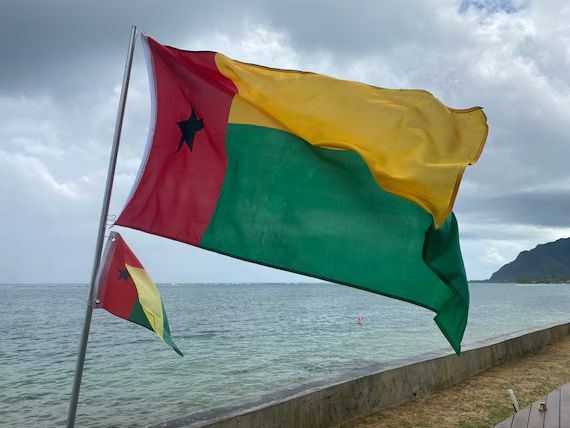
By: ThinkBusiness Africa Senior army officers announced on Wednesday that they had seized control of the West African nation “until further notice,” just days after a contentious general election for which official results are still pending. Reuters reported. Heavy gunfire erupted across the capital, Bissau, on Wednesday, specifically near the Presidential Palace, Later in the day, President Umaro Sissoco Embaló told the press that he had been detained by the army chief of staff, declaring the action a coup d’état. The military takeover comes directly on the heels of the general election held on Sunday, November 23, 2025. Both the incumbent President Embaló and his main challenger, Fernando Dias da Costa, prematurely declared outright victory on Monday, each claiming to have surpassed the 50% threshold needed to avoid a runoff, despite the National Electoral Commission (CNE) having yet to release provisional results, which were expected by November 27. Embaló had dissolved the opposition-controlled parliament in December 2023 following an earlier alleged coup attempt, ruling by decree ever since. The coup attempt places Guinea-Bissau in a growing line of West African nations—including Mali, Burkina Faso, and Niger—that have recently experienced military regimes through coup, undermining regional efforts to uphold constitutional rule.
Ghana central bank cuts interest rate, fueling business recovery on disinflation success
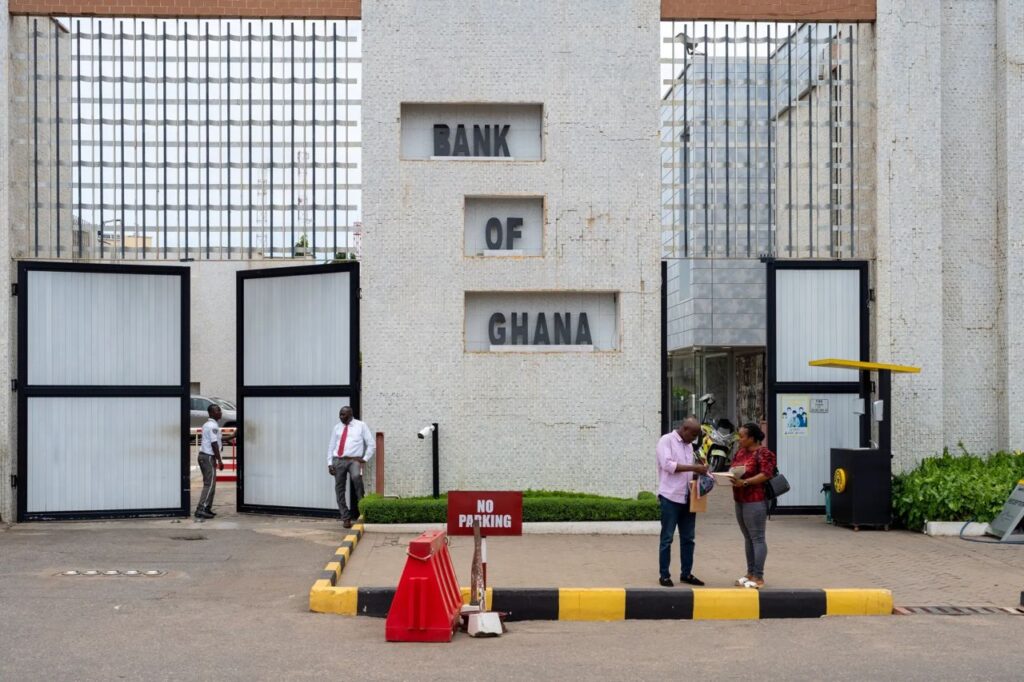
By: ThinkBusiness Africa The Bank of Ghana (BoG) delivered a powerful signal of confidence in the nation’s economic recovery, slashing its benchmark Monetary Policy Rate (MPR) by an aggressive 350 basis points (bps) to 18.0% on Wednesday. This is the central bank’s third consecutive steep rate cut this year and comes as Ghana’s disinflation process has exceeded expectations, placing the policy rate firmly in an easing cycle designed to stimulate credit expansion and boost economic growth. Ghana’s Monetary Policy Committee (MPC) decision was primarily driven by the sustained and sharp decline in consumer inflation. Ghana’s annual inflation peaked at 54% in January 2023,and dropped to a four-year low of 8.0% in October 2025, hitting the precise mid-point of the central bank’s medium-term target band of 6%-10%. Bank of Ghana Governor Johnson Asiama confirmed the optimistic outlook, stating that the significant fall in inflation and a stable external sector provided the necessary scope for an aggressive pivot from a tightening to an easing stance. “In taking the policy decision, the view of the Monetary Policy Committee was that overall, macroeconomic conditions have broadly improved, given the anticipated significant decline in inflation,” Governor Asiama stated. Since July 2025, the BoG has now reduced the MPR by a cumulative 1,000 basis points, unwinding a period of historically high rates used to combat the surging inflation of previous years. In September, (BOG) slashed the interest rate by a record 350 bps from 25% to 21.5%, complemented by the recent 350 bps reduction to 18.0% in November. The reduction in the policy rate is expected to have a transformative effect on the Ghanaian business landscape, which has been grappling with punitive borrowing costs for over two years. This latest MPR cut effect is anticipated to decline the Average Lending Rates (ALR) charged by commercial banks. Since the policy rate is the key anchor for short-term interbank lending, its decrease puts immense pressure on banks to reduce their own Ghana Reference Rate (GRR) and ultimately their lending spreads. Businesses will find it less costly to secure new loans for working capital, equipment purchases, and inventory financing. This eases liquidity constraints and improves cash flow management, especially for Small and Medium Enterprises (SMEs). By encouraging lending and investment, the central bank aims to provide a robust push to the real economy. Lower rates stimulate demand and production, supporting the recent uptick in economic activity signaled by composite indices. While the move is overwhelmingly positive for businesses, analysts caution that the full benefits may take time to materialize. Transmissions from the policy rate to actual commercial bank lending rates can often be slow. Banks must manage their own funding costs, risk profiles (including high non-performing loans), and overheads. Banks have been urged by the Governor to quickly adjust their lending rates downward to support the monetary policy objective.
Senegal’s economy grows by over 13% after rebasing, reduces debt ratio
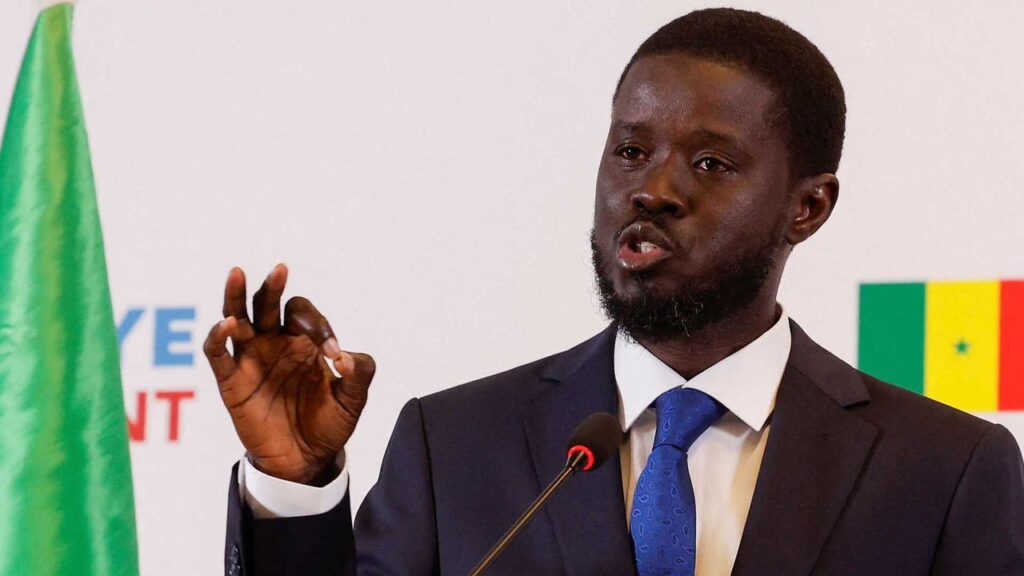
By: ThinkBusiness Africa The Senegalese government has announced a major upward revision to its Gross Domestic Product (GDP), a technical adjustment that has mechanically improved the nation’s key debt metrics as it grapples with a recent fiscal crisis. The GDP rebasing was published on Tuesday by the National Agency for Statistics and Demography (ANSD), updating the base year used for economic measurement from 2014 to 2021. Resulting in a 13.5% jump in the west African nations economy. Senegal’s official 2021 GDP figure has been revised upward by 13.5%, settling at a new total of 17,316 billion CFA francs ( $30.40 billion). Critically, this larger economic base instantly improves the country’s debt-to-GDP ratio. The public debt-to-GDP ratio for 2021 has dropped to 80% from the previous estimate of 90.8%. The timing of this announcement, and statistical boost provides the government with crucial breathing room as it seeks to stabilize its public finances following a major debt scandal. Last year, the new government revealed billions of dollars in previously unreported debt accumulated by the prior administration, leading to a major fiscal transparency crisis. Following the revelation, global credit rating agencies downgraded Senegal’s rating. S&P Global earlier this month downgraded Senegal’s long-term sovereign credit rating to “CCC+” from “B-“, citing its precarious debt position; with a huge debt-to-GDP ratio that was approaching 120% at the end of 2024. The International Monetary Fund (IMF) suspended its $1.8 billion lending program, demanding clear steps on fiscal reform and transparency. While the government had previously stated that S&P global did not factor in the imminent rebasing, this official release of the new figures provides a statistical counter-narrative to the crisis. The IMF is currently engaged in discussions with the Senegalese authorities on a new reform program, and new loan package, which will be essential for restoring creditor confidence and addressing the underlying challenges of elevated debt pressures and high gross financing needs.
16 banks meet Nigeria’s recapitalization target ahead of central bank deadline
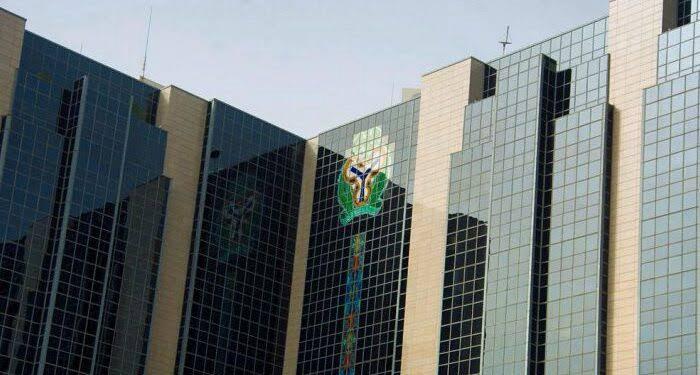
By: ThinkBusiness Africa The Governor of the Central Bank of Nigeria (CBN), Mr. Olayemi Cardoso, said on Tuesday, that 16 Deposit Money Banks (DMBs) have successfully met the new minimum capital requirements under the ongoing recapitalization exercise. He announced the new developments during a press briefing following the Monetary Policy Committee (MPC) meeting, signals significant progress in the CBN’s strategic initiative to fortify the nation’s financial system and enhance banks’ capacity to support a trillion-dollar economy. Governor Cardoso commended the pace of the exercise, noting that the number of compliant banks has steadily increased from the 8 banks reported as of July 2025 and the 14 banks announced in September 2025. The current figure of 16 banks suggests that the majority of institutions are actively closing the gap before the March 31, 2026, deadline. “The committee noted with satisfaction the sustained resilience of the banking system, with most financial soundness indicators remaining within regulatory thresholds,” Cardoso said. “Members also acknowledged the substantial progress in the ongoing recapitalization programme, with sixteen (16) banks achieving full compliance with the revised capital requirements.” He said. The CBN first unveiled the revised minimum capital requirements in March 2024, giving banks a 24-month window to meet the new thresholds through various means, including private placements, public offers, rights issues, or Mergers and Acquisitions (M&As). The required minimum paid-in capital varies based on the scope of a bank’s license: License Category Minimum Paid-in Capital (Naira Billion) Commercial (International) N500 Billion Commercial (National) N200 Billion Commercial (Regional) N50 Billion Merchant Bank N50 Billion Non-Interest (National) N20 Billion Source: Central Bank of Nigeria Several Tier-1 institutions, including Access Bank and Zenith Bank, were among the first to announce capital-raising moves, with Access Bank exceeding the N500 billion international threshold early on. Governor Cardoso has previously clarified the options available to banks that may struggle to meet the target for their current license category. Banks that cannot meet the capital requirement for their current license (e.g., International) may choose to downgrade to a smaller operating license (e.g., National or Regional). The CBN has continuously stressed that the objective is not to destabilize the banking sector but to build a more resilient and robust financial system capable of handling the larger financial needs of Nigeria’s growing economy and absorbing potential economic shocks.
Nigeria’s central bank retains key interest rate at 27.0% to consolidate disinflation
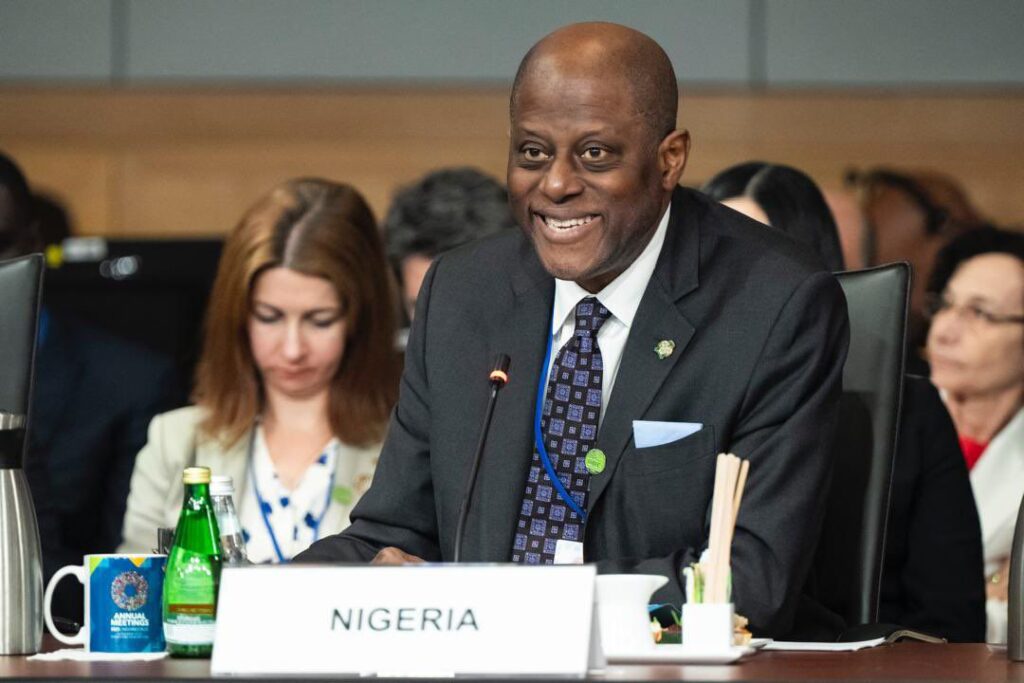
By: Chidozie Nwali The Central Bank of Nigeria (CBN), at the conclusion of its Monetary Policy Committee (MPC) meeting on Tuesday, announced its decision to retain the benchmark Monetary Policy Rate (MPR) at 27.0%, as inflation eases for the seventh consecutive month. CBN Governor, Mr. Olayemi Cardoso, who chaired the meeting, confirmed the unanimous decision by the committee members to hold all key policy parameters constant, with a minor adjustment to the Standing Facilities Corridor. The primary driver for the hold decision is the successful sustained disinflation observed in the Nigerian economy. Headline inflation has steadily moderated, falling for the seventh consecutive month, from a peak of 24% in January to 16.05% in October 2025. The MPC noted that the previous rate cut of 50 basis points (to 27%) in September, combined with stringent liquidity management measures, has achieved the desired effect of stabilizing prices and anchoring inflation expectations. In September, Nigeria had its first interest rate cut in 5 years. The MPC slashed the rate by 50 basis points from 27.50% to 27%; after experiencing six consecutive months of disinflation. “The Committee’s decision was underpinned by the need to sustain the progress made so far towards achieving low and stable inflation.” Governor Cardoso said. Aside inflation victory, the Nigerian economy has continued its expansion, recording 4.23% real GDP growth in the second quarter of 2025, driven by strong performance in the non-oil sectors and a significant recovery in the oil sector. Gross External Reserves have remained robust, reaching $46 billion in November providing a healthy import cover and supporting the CBN’s capacity to manage the foreign exchange market.
Conflict pushes 35 million Nigerians to brink of starvation
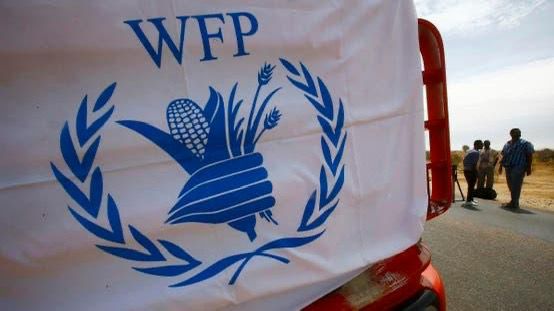
By: ThinkBusiness Africa The World Food Programme (WFP) issued a dire and unprecedented warning on Tuesday, projecting that nearly 35 million people in Nigeria could face severe food insecurity by the 2026 lean season. This staggering figure, the highest ever recorded in the nation’s history, is driven overwhelmingly by escalating violence and persistent conflict across Nigeria’s northern states. A surge in attacks by various armed groups, including the long-running insurgency in the Northeast (Borno, Adamawa, and Yobe states) and a spiral of banditry, kidnapping, and communal clashes in the Northwest and North-Central regions, has paralyzed agriculture. This Widespread attacks have deterred rural farming communities from accessing and cultivating their land, crippling local food production in Nigeria’s key agricultural belts. In 2025 Nigeria has been faced with high security threats: recently, ISWAP fighters killed a brigadier-general in the northeast, while 51 school children were kidnapped by terrorists in Niger state (Northern Nigeria); and 38 Christian worshippers were abducted by bandits from a church in Kwara state (Western Nigeria). All happened last week. The WFP predicts that at least 15,000 people in Borno state—the epicenter of the security crisis—will confront Catastrophe (CH Phase 5), which represents famine-like conditions, during the 2026 lean season. David Stevenson, WFP Nigeria Country Director, warned that if hunger is not contained, “growing desperation could fuel increased instability with insurgent groups exploiting hunger to expand their influence, creating a security threat that extends across West Africa and beyond.” He said. Despite marginal easing in some areas, the cost of living remains cripplingly high. Rising transportation costs, a volatile Naira exchange rate, and elevated prices for essential agricultural inputs like fertilizer continue to strain household purchasing power and reduce access to nutritious diets. Many households are maintaining acceptable food consumption by reducing meal quality, reducing meal quantity, or borrowing money. The crisis is being severely compounded by a lack of international funding. The WFP urgently warned it will run out of resources for emergency food and nutrition assistance by December of this year. This funding cliff will leave the nearly one million people in the Northeast who rely on WFP aid without vital support in 2026. Prior funding shortfalls already forced the agency to scale down nutrition programs in July, affecting over 300,000 children. The WFP’s biggest donor, the United States, has slashed its foreign aid under President Donald Trump, and other major nations have also made or announced cuts in assistance. In areas where clinics were forced to close due to these cuts, malnutrition rates in children worsened from “serious” to “critical” in the third quarter. Children in Borno, Sokoto, Yobe, and Zamfara are the most vulnerable to acute malnutrition.
Dangote taps Honeywell to double refinery output, pushing capacity to world-beating 1.4 million bpd

By: ThinkBusiness Africa The Dangote Petroleum Refinery, already the largest single-train refinery globally, has entered into a landmark agreement on Tuesday, with multinational technology firm Honeywell to spearhead an ambitious capacity expansion that will see the facility nearly double its output to an unprecedented 1.4 million barrels per day (bpd) by 2028. According to a statement from the Dangote Group, Honeywell will supply advanced process technologies, proprietary catalysts, specialized equipment, and technical services necessary for the massive scale-up. Its Capacity Goal is to Increase from 650,000 bpd crude processing to 1.4 million bpd by 2028. The technologies provided by Honeywell’s UOP division will allow the refinery to process a wider and more diverse range of crude oil grades, ensuring operational flexibility critical to its expanded capacity. Dangote Refinery, located in the Lekki Free Zone Lagos state, boasts an existing capacity of 650,000 bpd. The expansion is centered on adding a second, large-scale single-train processing unit, When fully operational at 1.4 million bpd, the complex will have the capacity to process nearly all of Nigeria’s current crude oil production of approximately 1.5 million bpd, a critical milestone for Africa’s largest economy. Beyond refined fuels like Euro-V quality gasoline, diesel, and jet fuel, the partnership will also dramatically boost the refinery’s petrochemical production capability. Dangote is licensing Honeywell’s C3 Oleflex™ technology, which converts propane into high-value propylene via catalytic dehydrogenation. This move will ensure the increase of propylene production by an additional 750,000 metric tons per year (MTPA); pushing the facility’s total annual polypropylene production capacity to 2.4 million MTPA. Polypropylene is an essential industrial material used widely in plastics, packaging, and automotive components. This massive boost in petrochemical output underscores the company’s intent to be a major global player in this sector, moving Nigeria beyond a mere crude exporter. The expansion comes at a pivotal moment, with Nigeria having historically depended heavily on imported refined products despite being a major crude oil producer. Aliko Dangote, President of the Dangote Group, stated, “Our continued collaboration with Honeywell marks a significant milestone not only for Dangote’s refinery but for Nigeria’s energy sector as a whole.” The agreement reinforces the nearly decade-long working relationship between Dangote and Honeywell, whose UOP technologies were foundational to the initial 650,000 bpd facility. While the financial terms of the new agreement were not disclosed, Reuters reported the technology contract alone could be valued at over $250 million.
Nigeria pushes for permanent UN security council seat at AU-EU summit
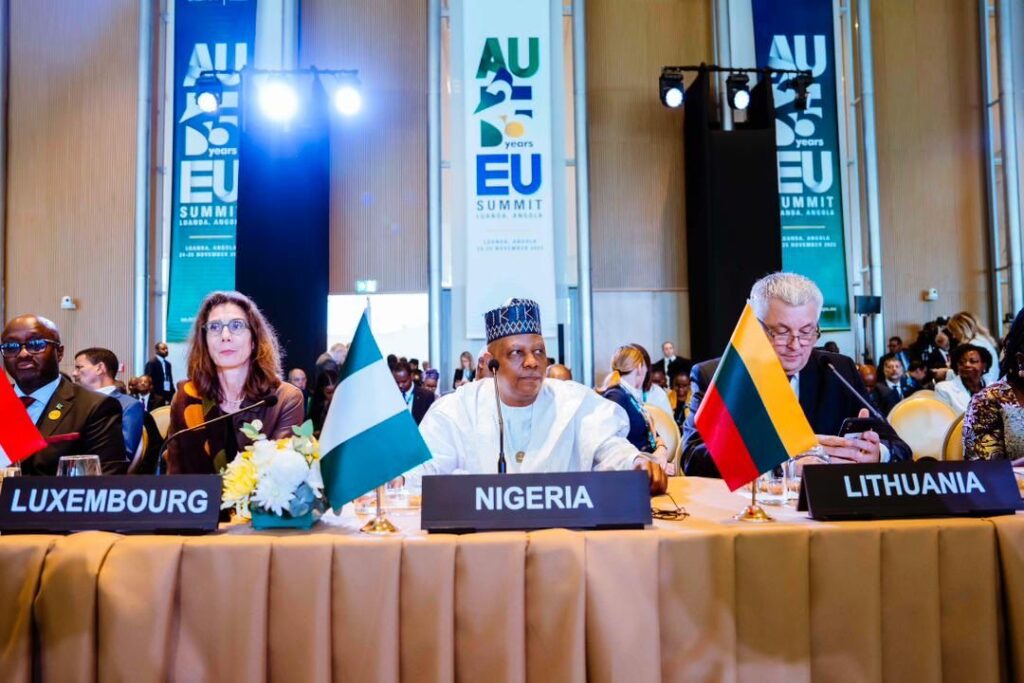
By: ThinkBusiness Africa Nigeria has decisively intensified its push for Africa to secure permanent seats with veto power on the United Nations (UN) Security Council, simultaneously calling for a fundamental shift to African-led frameworks for peace and security across the continent. The demands were presented by President Bola Ahmed Tinubu, represented by Vice President Kashim Shettima, during the first plenary session on Peace, Security, Governance, and Multilateralism at the 7th African Union–European Union (AU-EU) Summit in Luanda, Angola, on Monday. President Tinubu insisted that a comprehensive reform of the global governance system is long overdue, highlighting the lack of permanent African representation on the UN Security Council as a historical injustice. He had made the same call at the 80th UN general assembly in September, stating that the demand for a permanent seat at the UN Security Council isn’t a privilege but a right the continent had earned. “It is time for Africa to occupy permanent seats on the UN Security Council, with all attendant privileges, including the veto,” the President stated. He called for the immediate commencement of “Genuine text-based negotiations under the Intergovernmental Negotiations (IGN) framework,” and urged EU Member States to support Africa’s “long-standing and legitimate call for reform of the United Nations.” Addressing the persistent challenges of armed conflict, illicit weapons, climate pressures, irregular migration, and political instability, President Tinubu tasked the European Union (EU) with co-creating peace and security initiatives that are anchored on African-led frameworks. He firmly rejected the use of private military and security companies (PMCs) in African conflicts, warning that their presence often complicates resolution efforts and undermines state sovereignty. “Externally driven initiatives, however well-intentioned, cannot succeed at pace without strong regional ownership and a grounded understanding of local dynamics,” the President cautioned, emphasizing that stability requires genuine partnership rooted in regional priorities. The Nigerian leader reaffirmed the country’s commitment to advancing peace, security, and democratic governance across the continent. He cited the Multinational Joint Task Force (MNJTF) in the Lake Chad Basin as an effective model of African-led cooperative security. He also disclosed that non-kinetic measures employed by the Nigerian government have led to significant gains against insurgency. “As of early 2025, over 120,000 Boko Haram-affiliated individuals, including family members, have surrendered,” he announced. Furthermore, President Tinubu highlighted Nigeria’s ongoing efforts to enhance regional capacity through the recent Sea-Lift Agreement between the Nigerian Navy and the AU Standby Force (ASF), which aims to boost Africa’s rapid deployment capabilities for peace operations and humanitarian support. Recently, Nigeria is faced with intense security challenges. 51 school children were kidnapped by terrorists in Niger state (Northern Nigeria); and 38 Christian worshippers were abducted by bandits from a church in Kwara state (Western Nigeria). All happened last week, forcing the president to cancel his trip for the G20 summit in South Africa, and the AU-EU Summit in Angola. However, the president said on Sunday that following swift intervention by the security forces all the 38 worshippers were rescued, and the 51 school children had been recovered.


